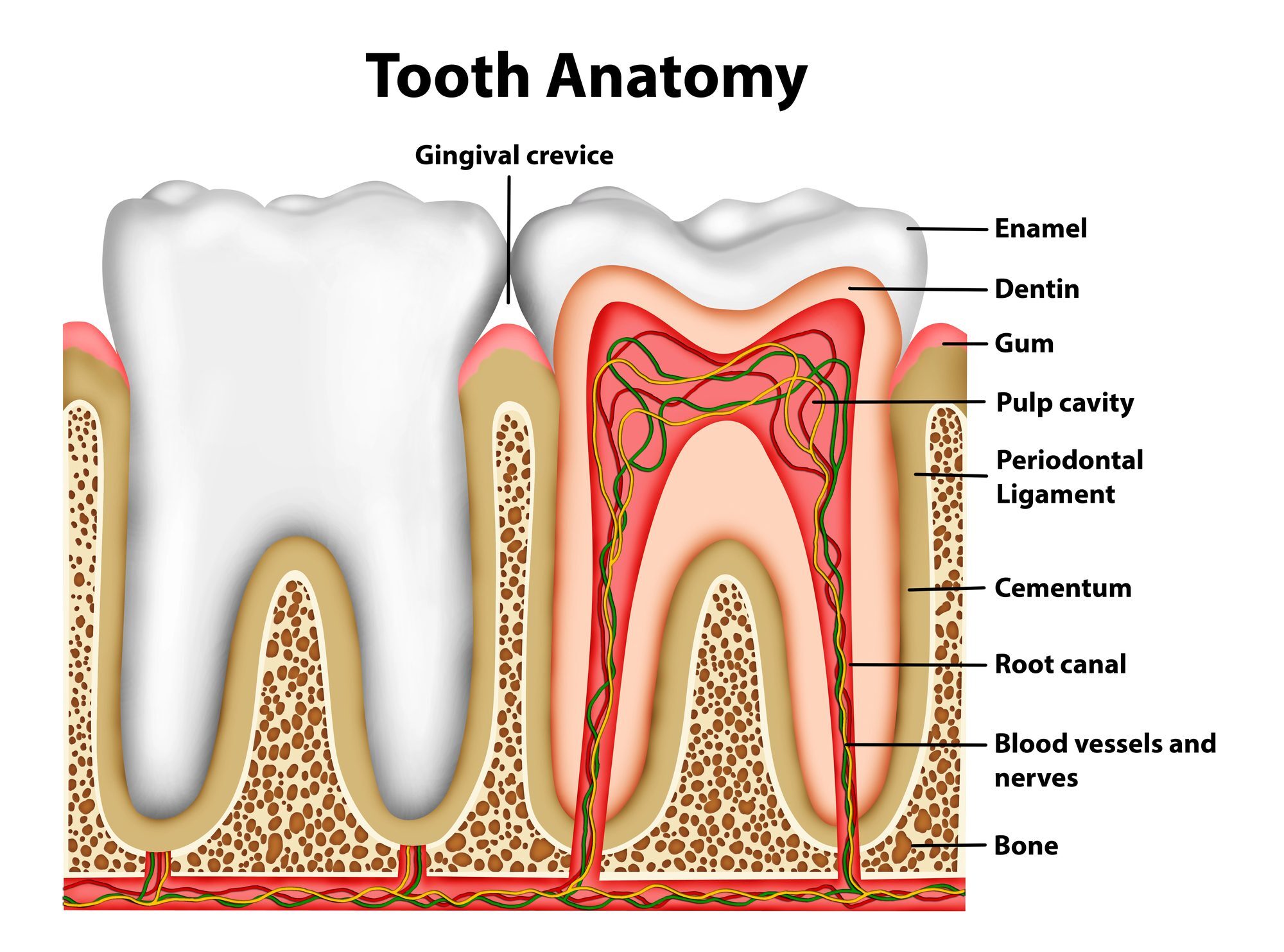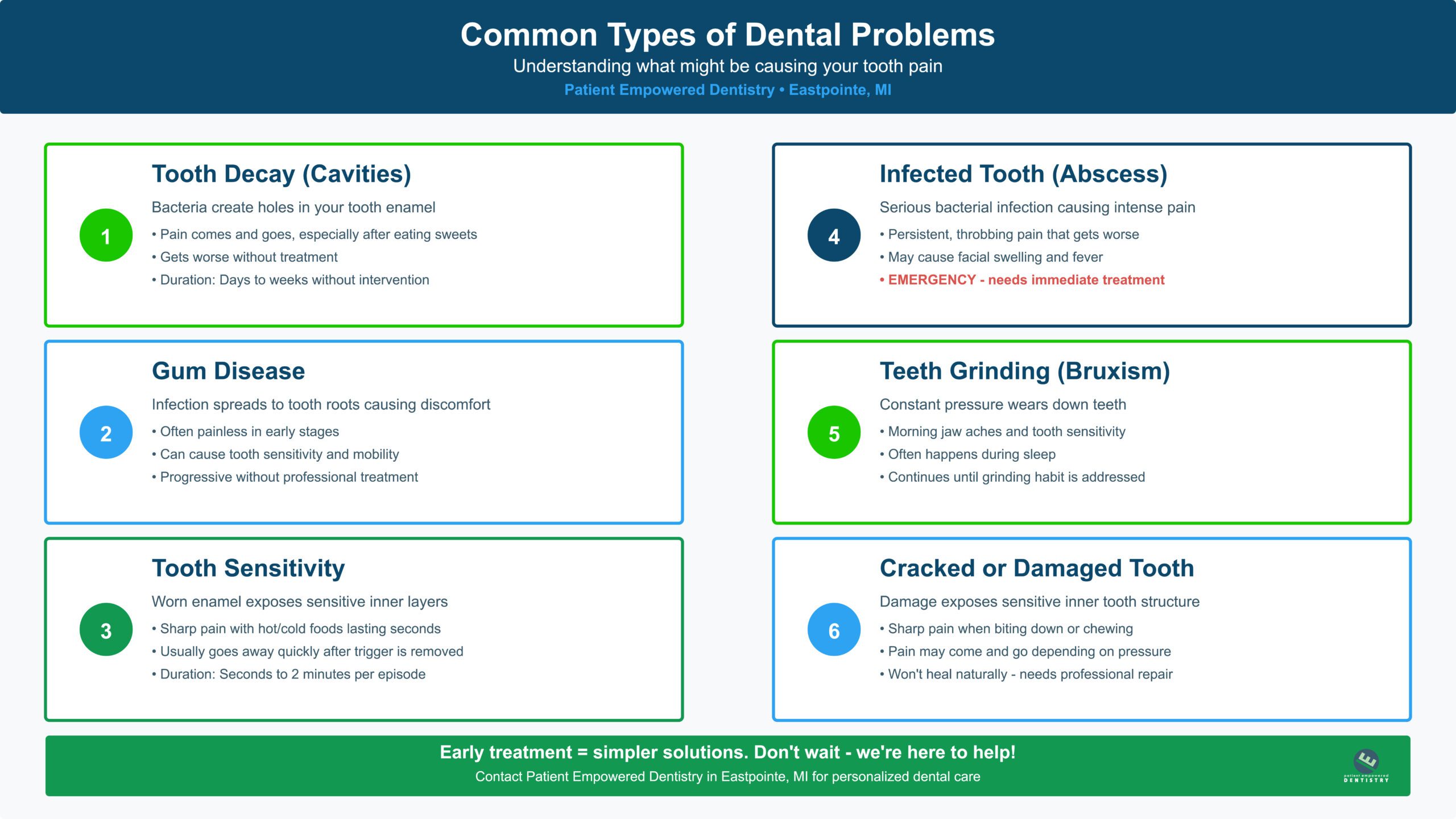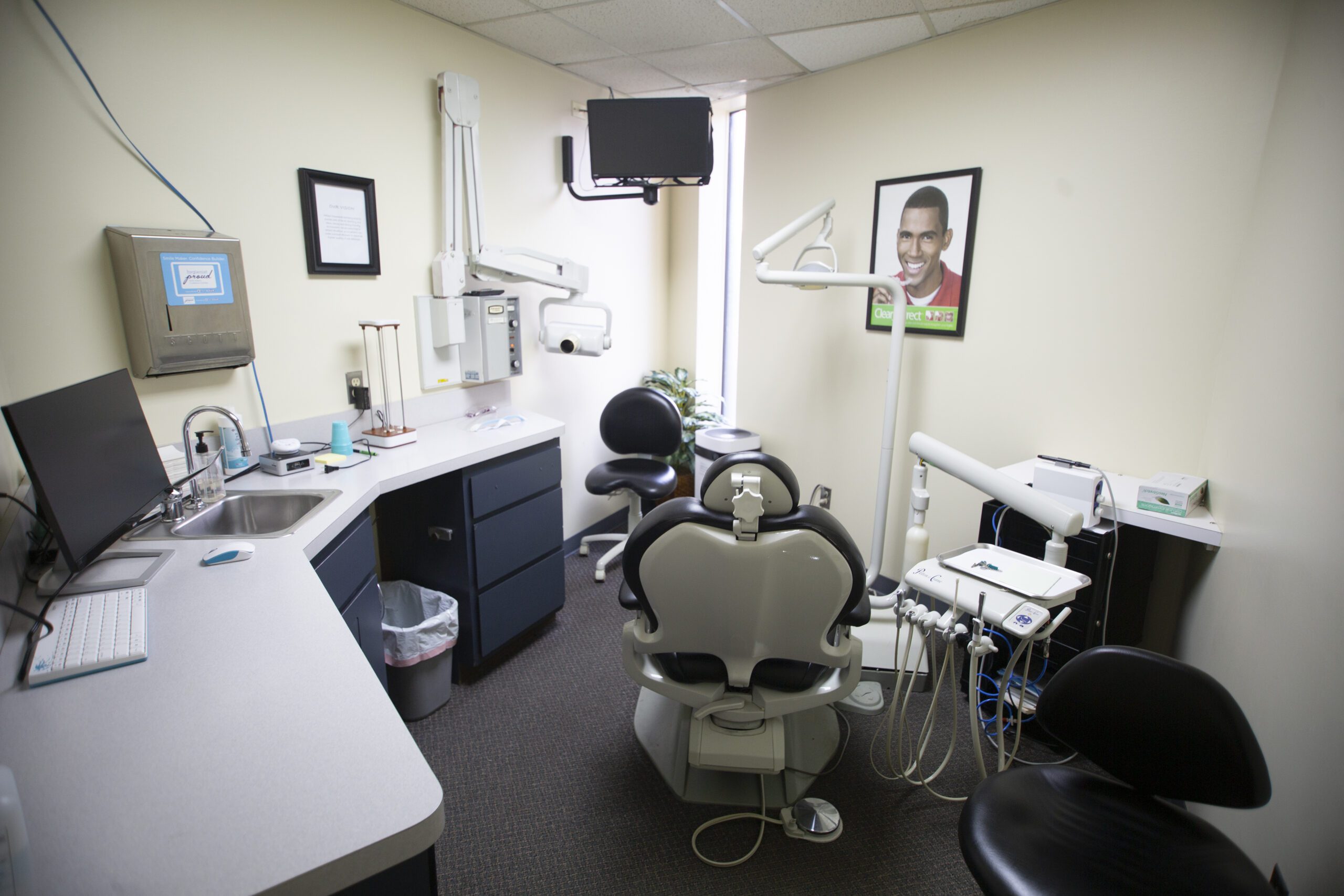Tooth pain has a knack for showing up at the worst possible moments – right before a big presentation, during a family vacation, or in the middle of the night. If you’re wondering “how long will this tooth pain last?” while dealing with discomfort, you’re definitely not alone. We hear this question daily here at our Eastpointe office.
The honest answer? It depends on what’s causing your pain. Let’s walk through the different types of tooth pain and what you can expect for each, so you can make informed decisions about your dental care.

Why Your Tooth Hurts in the First Place
That aching or throbbing sensation is actually your body’s way of saying “something needs attention here.” Once we figure out what’s triggering your discomfort, we can give you a much clearer picture of your timeline to relief.
Your teeth are remarkably resilient, but they’re not invincible. The outer layer (enamel) protects the sensitive inner parts, but when that protection gets compromised – whether through decay, injury, or wear – you’ll feel it.
Common Causes Behind Your Toothache

What Might Be Causing Your Pain
Understanding what might be causing your pain helps us determine how long it’ll stick around:
- Tooth decay: When bacteria create cavities in your enamel, exposing the sensitive layers underneath
- Gum disease: Infections that can spread to tooth roots and create ongoing discomfort
- Tooth sensitivity: Worn enamel that exposes the inner tooth structure to hot, cold, or sweet triggers
- Infected tooth: A serious bacterial infection that causes intense, throbbing pain and needs immediate care
- Teeth grinding: Constant pressure that wears down your teeth and creates sensitivity
- Damaged restorations: When old fillings crack or come loose, exposing sensitive areas
How Long Different Types of Tooth Pain Actually Last
Here’s where we get specific about timelines. Not all tooth pain follows the same pattern, and knowing what you’re dealing with helps set realistic expectations.
Temperature Sensitivity
Duration: Seconds to 2 minutes
That quick sharp sensation when you bite into ice cream or sip hot coffee? If it goes away quickly, you’re likely dealing with mild sensitivity from enamel wear or gum recession. This type of pain typically disappears as fast as it arrives.
Early Tooth Decay Pain
Duration: Days to weeks (and gets worse without treatment)
Cavity pain is sneaky – it comes and goes, especially after eating sweets. You might think it’s getting better, but decay doesn’t fix itself. The pain will return and intensify until the cavity is properly treated.
Post-Treatment Discomfort
Duration: 1-3 days
Just had a dental filling or other dental work? Some tenderness is completely normal as your tooth adjusts to its “new normal.” This typically fades within a few days.
Grinding-Related Pain
Duration: Ongoing until addressed
Waking up with jaw soreness or tooth sensitivity? That’s your mouth telling you about nighttime grinding. This type of discomfort continues until we address the underlying grinding habit, often with a custom night guard.
Cracked Tooth Pain
Duration: Won’t resolve on its own
Sharp pain when you bite down? That’s typically a crack in your tooth structure. This won’t heal naturally – the tooth needs professional repair to prevent further damage and eliminate the pain. You can learn more about temporary fixes for broken teeth while you wait for your appointment.
Deep Infection or Abscess
Duration: Gets progressively worse
When a tooth becomes severely infected, the pain is intense and persistent. This is one situation where waiting isn’t an option – the infection can spread and become dangerous without prompt treatment.
Extraction Recovery
Duration: 3-7 days
Had a tooth removed? Your healing process typically peaks around day three, with most discomfort resolving within a week when you follow post-op instructions.
Root Canal Recovery
Duration: 2-3 days
Contrary to old myths, modern root canal treatment has minimal post-procedure discomfort. Most patients are pleasantly surprised by how manageable the recovery actually is.
When Tooth Pain Signals a Dental Emergency
⚠️ Contact Us Immediately If You Experience:
Some situations can’t wait for a regular appointment. Contact us immediately if you experience:
- Severe pain that doesn’t respond to over-the-counter medication
- Facial swelling (a sign that infection is spreading)
- Fever along with dental pain
- Difficulty swallowing or breathing
- Continuous bleeding
- A bad taste in your mouth with pain
These symptoms can indicate a serious infection that needs immediate professional attention. Remember, emergency rooms typically can’t provide dental treatment, so it’s best to contact our office directly for urgent care.
Safe Pain Relief While You Wait for Your Appointment
Temporary Relief Strategies
While you’re arranging your dental visit, these approaches can provide temporary relief:
- Over-the-counter pain relievers: Ibuprofen is particularly effective because it reduces inflammation
- Cold compress: Apply for 15 minutes at a time to reduce swelling and numb pain
- Salt water rinse: Mix half a teaspoon of salt in warm water to help reduce inflammation and provide temporary relief
- Avoid triggers: Skip very hot, cold, or sweet foods and drinks
- Soft foods: Give your tooth a break from hard chewing
Remember, these are temporary measures to help you stay comfortable – they won’t solve the underlying problem.

Long-Term Solutions for Lasting Relief
Professional Treatment Options
Real relief comes from treating the root cause of your pain. Depending on what we find during your examination, treatment might include:
- Dental fillings for cavities
- Crowns for extensively damaged teeth
- Root canal therapy for infected teeth
- Gum disease treatment for infection-related pain
- Custom night guards for grinding-related damage
- Fluoride treatments for sensitivity
The earlier we catch and treat dental problems, the simpler and less expensive the solution typically is.
Preventing Future Tooth Pain
Your Prevention Checklist
While you can’t prevent every dental issue, you can significantly reduce your risk:
- Brush twice daily with fluoride toothpaste
- Floss daily (your gums will thank you!)
- Limit sugary foods and acidic drinks
- Don’t use your teeth as tools
- Visit us regularly for checkups and cleanings
- Address small problems before they become big ones
The Bottom Line on Tooth Pain Duration
Mild sensitivity might resolve quickly with proper care, but decay, infection, or structural damage typically causes persistent pain until professionally treated. Your body uses pain as an important messenger – when it comes to your teeth, it’s worth listening.
The key insight? Early treatment almost always means simpler, more comfortable, and less expensive solutions. According to dental health experts, waiting rarely makes dental problems better, but it often makes them more complex to treat.
Get the Relief You Deserve
You don’t have to live with tooth pain. Our Eastpointe team understands that dental discomfort affects every aspect of your life – from eating and sleeping to concentrating at work.
We’ll take the time to explain what’s causing your pain and discuss all your treatment options, so you can make the best decision for your health and comfort. Schedule your appointment today, and let’s get you back to feeling great!
